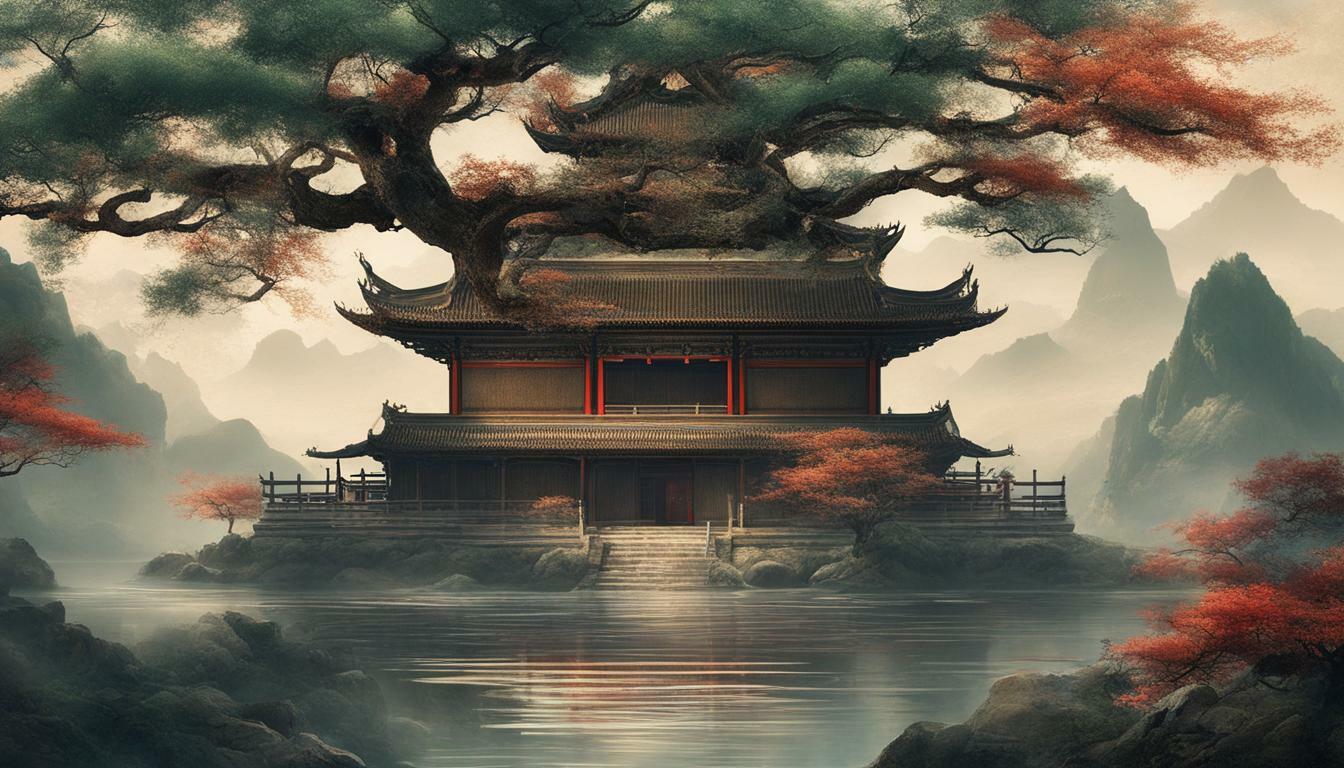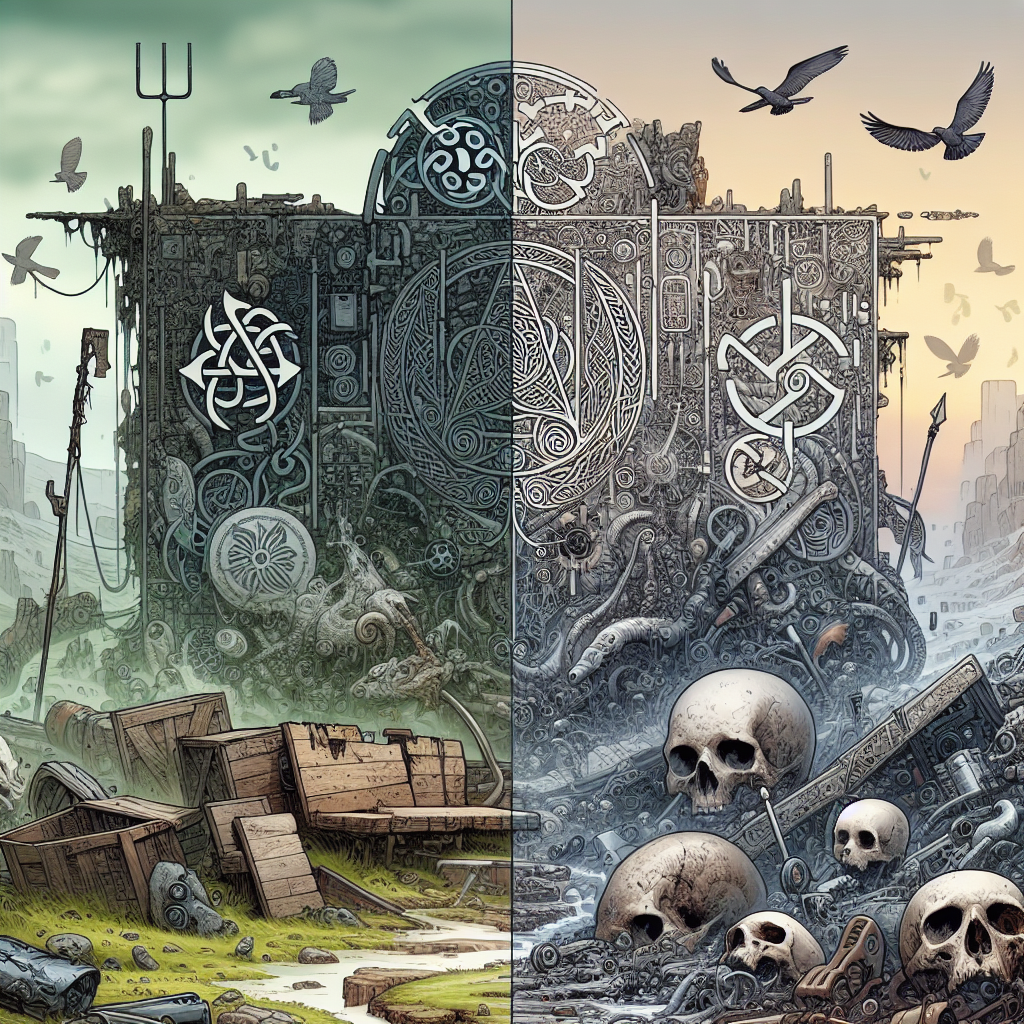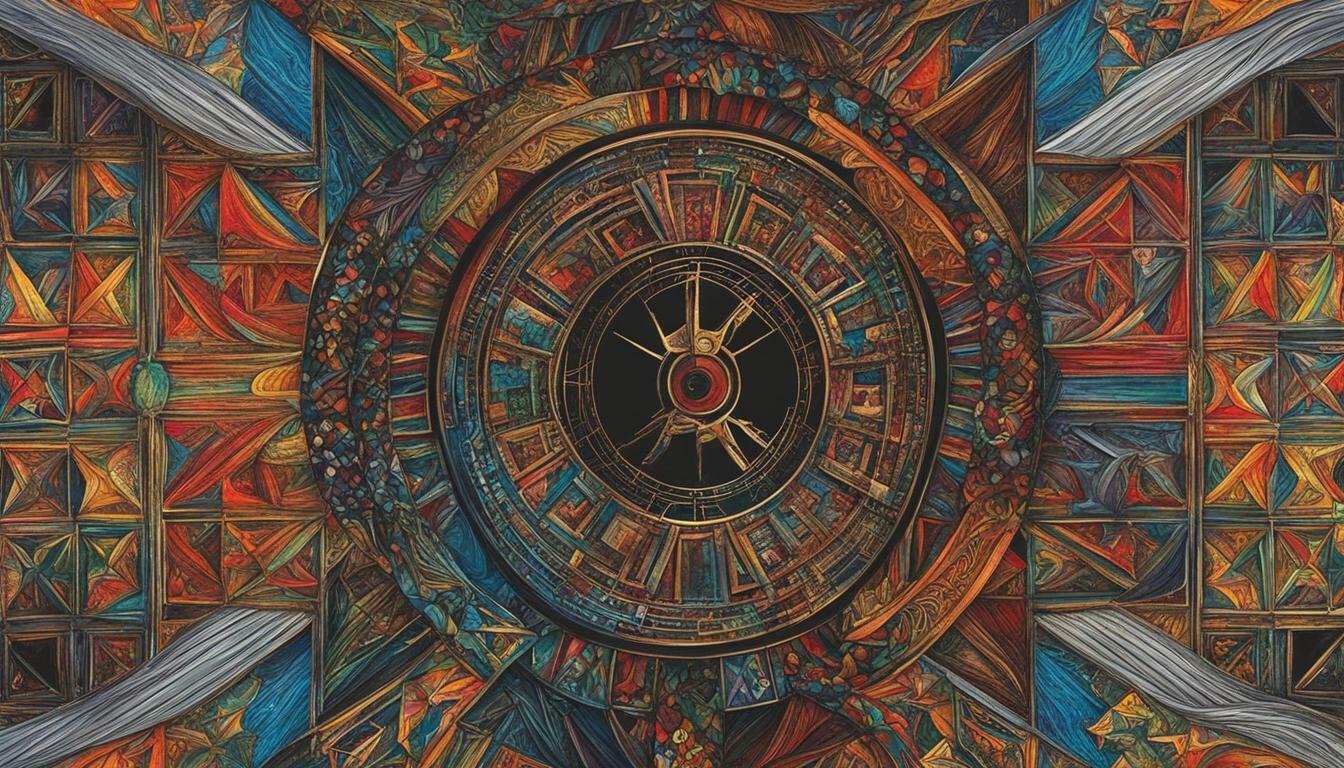Confucianism and Taoism have distinct viewpoints when it comes to ancestors and ancestral worship. In Confucianism, ancestors and heritage hold significant importance, although they are not worshiped. Confucianists visit temples to pay homage to ancestors, along with Ti’en (social power) and Confucius. They also follow rituals for birth, marriage, and death, such as carrying a willow branch during a funeral.
On the other hand, Taoism views ancestors as an integral part of religious practice. Taoist religious practices involve worshiping many gods and ancestors. Taoists believe that if immortality isn’t attained during life, the Tao will continue to evolve and manifest in different forms, according to one’s conduct.
Despite their differences, both Confucianism and Taoism have influenced Chinese society and continue to play a significant role in Chinese culture.
Key Takeaways:
- Confucianism and Taoism have different perspectives on ancestors and ancestral worship.
- Confucianists consider ancestors and heritage important but do not worship them.
- Taoism includes ancestor worship as part of its religious practices.
- Taoists believe in the evolution of the Tao and its manifestation in different forms.
- Both Confucianism and Taoism have had a profound impact on Chinese society and culture.
Ancestor Worship in Confucianism and Taoism
Ancestor worship holds distinct significance in Confucianism and Taoism, with varying rituals and practices associated with it. In Confucianism, ancestors and heritage are highly valued, but they are not worshiped as deities. Confucianists pay homage to their ancestors by visiting ancestral temples, where they offer prayers, burn incense, and perform rituals to honor their ancestors’ spirits. These rituals are an essential part of Confucian practices, along with paying respect to Ti’en (social power) and Confucius himself.
Confucianists also follow specific rituals during important life events, such as birth, marriage, and death. For example, during a funeral, it is customary to carry a willow branch to escort the deceased to their final resting place. These rituals not only honor the ancestors but also maintain a connection between the living and the deceased, emphasizing the importance of familial ties and heritage in Confucian beliefs.
On the other hand, Taoism views ancestor worship as an integral part of their religious practices. Taoists believe in the existence of many gods and ancestors who can bestow blessings and protect individuals. Taoist rituals often involve making offerings to ancestors, such as food and other symbolic items, to show respect and seek their guidance and support. Taoists also believe that by honoring and worshiping ancestors, they can cultivate positive energy and attain spiritual harmony.
Taoism also has a unique perspective on the afterlife. Taoists believe that if a person does not attain immortality during their lifetime, the Tao will continue to evolve and manifest in different forms, depending on one’s conduct and beliefs. This belief underscores the Taoist approach to ancestor worship, as they see it as a means to continue the cycle of life and maintain a connection with the spiritual realm.
The Role of Ancestor Worship in Confucianism and Taoism
While Confucianism and Taoism have contrasting views on ancestor worship, both philosophies have had a profound influence on Chinese society and culture. The emphasis on ancestral heritage in Confucianism has shaped traditional Chinese family values, fostering a sense of filial piety and respect for elders. These values continue to be deeply ingrained in Chinese society, impacting social relationships and moral ethics.
Similarly, Taoism’s belief in the spiritual realm and the importance of ancestor worship has shaped Chinese religious practices and rituals. The practice of making offerings to ancestors is still prevalent in many Chinese households, especially during important occasions and festivals. The influence of Confucianism and Taoism on Chinese culture can be seen not only in religious customs but also in art, literature, and philosophy.
| Confucianism | Taoism |
|---|---|
| Emphasizes ancestor reverence | Believes in worshiping ancestors |
| Temple visits and rituals | Making offerings to ancestors |
| Heritage and filial piety | Connection with the spiritual realm |
In conclusion, while Confucianism and Taoism may have different beliefs and practices regarding ancestors, both philosophies recognize the significance of ancestral heritage. Confucianists honor their ancestors through rituals and visitations, while Taoists see ancestor worship as a means to connect with the spiritual realm. These beliefs and practices have had a lasting impact on Chinese society and continue to shape Chinese culture today.
Confucianism’s Perspective on Ancestors
In Confucianism, ancestors are highly regarded as an integral part of heritage and societal values, although they are not worshiped. Confucianists believe that honoring one’s ancestors is a way to show respect and gratitude for the sacrifices made by previous generations. They visit temples to pay homage to their ancestors, expressing their filial piety and deep appreciation for their family lineage.
Confucian rituals for birth, marriage, and death also involve the veneration of ancestors. For example, during a funeral, it is common for mourners to carry a willow branch, symbolizing the connection between the living and the deceased. Through these rituals, Confucianists seek to maintain their familial bonds and preserve the wisdom and teachings passed down by their ancestors.
According to Confucius, the ultimate goal is to cultivate oneself morally and improve society. An integral part of this cultivation is the transmission of moral virtues from one generation to the next. By respecting and honoring their ancestors, Confucianists strive to continue the legacy of moral excellence, ensuring a harmonious society rooted in respect, filial piety, and gratitude.
Taoism’s Perspective on Ancestors
Taoism places a significant emphasis on ancestral veneration and considers ancestors an integral part of their religious practices. For Taoists, ancestors are not merely figures of the past, but rather, they are believed to possess spiritual power and wisdom that can guide and protect the living. This belief is rooted in the Taoist concept of immortality, where it is believed that one’s conduct in life determines their fate in the afterlife and their ability to attain immortality.
According to Taoist beliefs, the ancestral spirits continue to evolve and manifest in different forms, depending on the actions of their descendants. Therefore, it is crucial for Taoists to honor and worship their ancestors through various rituals and ceremonies. Ancestral altars are commonly found in Taoist households, where offerings such as food, incense, and other symbolic items are made as a sign of respect and gratitude to the ancestors.
Taoists also believe in the existence of multiple gods, spirits, and deities, and they may include these entities in their ancestral worship. This demonstrates the rich and diverse spiritual practices within Taoism, where the veneration of ancestors is deeply intertwined with the worship of other divine beings.
The contrasting perspectives of Confucianism and Taoism on ancestors reflect the different philosophical foundations and belief systems of these two ancient Chinese traditions. While Confucianism emphasizes the importance of ancestors and heritage without worshiping them, Taoism embraces the worship and veneration of ancestors as an integral part of their religious practices. Despite these differences, both Confucianism and Taoism have played significant roles in shaping Chinese culture and continue to influence Chinese society to this day.
Influence of Confucianism and Taoism on Chinese Culture
The philosophies of Confucianism and Taoism have profoundly influenced Chinese society and culture, including their beliefs and practices related to ancestors. While both philosophies have differing views on ancestral worship, they have shaped the way the Chinese people honor and respect their heritage.
In Confucianism, ancestors and heritage hold great importance. Confucianists visit temples to pay homage not only to their ancestors, but also to Ti’en, representing social power, and Confucius himself. These rituals are deeply rooted in Confucian beliefs and are followed during significant life events such as birth, marriage, and death. For example, during a funeral, it is customary to carry a willow branch as a symbol of mourning and respect.
Taoism, on the other hand, views ancestor worship as an integral part of its religious practices. Taoists believe in the worship of many gods and ancestors, as they consider them to hold divine power and influence. In Taoism, there is a belief that if one does not attain immortality during their lifetime, the Tao will continue to evolve and manifest in different forms based on an individual’s conduct.
Despite their contrasting beliefs on ancestral worship, both Confucianism and Taoism have had a lasting impact on Chinese culture. Their teachings and practices have shaped the way Chinese society views and honors their ancestors. The respect for heritage and the importance of maintaining ancestral connections are deeply ingrained in the Chinese way of life.
| Confucianism | Taoism |
|---|---|
| Confucianists pay homage to ancestors, Ti’en, and Confucius | Taoists worship many gods and ancestors |
| Confucian rituals are followed during significant life events | Taoist practices involve ancestral worship as part of their religious traditions |
| Confucianism emphasizes the importance of heritage and ancestor veneration | Taoism believes in the manifestation of the Tao through conduct and ancestral connections |
Conclusion
In conclusion, Confucianism and Taoism offer contrasting viewpoints on ancestors and ancestral worship, with Confucianists valuing heritage while Taoists emphasize ancestral veneration as part of their religious practices.
In Confucianism, ancestors and heritage hold significant importance, although they are not worshiped. Confucianists visit temples to pay homage to their ancestors, as well as to Ti’en (social power) and Confucius. Rituals associated with birth, marriage, and death are also followed, such as carrying a willow branch during funerals.
On the other hand, Taoism views ancestors as an integral part of religious practice. Taoist worship involves paying homage to multiple gods and ancestors. Taoists believe that if one does not attain immortality during their lifetime, the Tao will continue to evolve and manifest in different forms based on a person’s conduct.
Despite their differences, both Confucianism and Taoism have had a profound influence on Chinese society and continue to play a significant role in Chinese culture.
FAQ
What are the key differences between Confucianism and Taoism regarding ancestors?
Confucianism considers ancestors and heritage important but not worshiped, while Taoism views ancestors as part of religious practice and involves worshiping them.
How do Confucianists pay homage to ancestors?
Confucianists visit temples to pay homage to ancestors, along with Ti’en (social power) and Confucius. They also follow rituals for birth, marriage, and death, such as carrying a willow branch during a funeral.
How do Taoists view ancestor worship?
Taoists believe in worshiping ancestors as part of their religious practices and see it as a way to connect with the Tao and achieve immortality.
What is Confucianism’s perspective on ancestors?
Confucianism considers ancestors and heritage important aspects but does not worship them. Temples and paying homage to ancestors play a role in Confucian rituals.
What is Taoism’s perspective on ancestors?
Taoism views ancestors as part of religious practice and involves worshiping them. Taoist beliefs also encompass the idea of the Tao evolving and manifesting in different forms according to one’s conduct.
How have Confucianism and Taoism influenced Chinese culture?
Confucianism and Taoism have both played significant roles in shaping Chinese beliefs and traditions related to ancestors. Their influence can still be seen in contemporary Chinese practices.
 Skip to main content
Skip to main content


